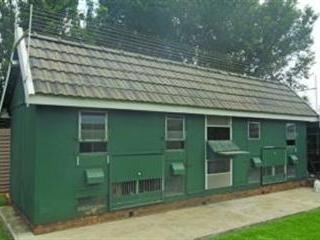
Many top-class racers often fail to pass on their ‘abilities’ to their young. Sometimes the ‘winning edge’ is missing in the first generation offspring only to suddenly pop up again in the third generation. Then again, you’ll often find the under-performing brother or sister of our champion racers becomes the better breeder.
Some strains or pigeon families cross better with others, but that doesn’t mean quality racers are a given. The bottom line is, favourable genes aren’t passed down in a straight line from generation to generation. Instead, it seems they’re all too easily hijacked by inferior genes. For example, the direct offspring of an ace pair bought for R550 000 at the Sun City Million Dollar Pigeon Race by a Cape Town fancier failed to produce similar top scorers.
You can’t buy success with breeding – it requires skill, patience and a willingness to experiment. We can steer the gene pool in a desired direction, but we can’t manipulate it as a puppeteer can a puppet.
Preserve quality
Still, it helps to have as many top breeders of performers in the pedigree as is possible. This makes for an expensive breeding programme, but as they say: “You get what you pay for”. Also remember to ensure that the pedigrees of the pigeons you use show a long history of super breeders and racers in strong competition over similar distances and the same weather conditions in which your birds will be expected to perform. When you finally own enough quality racers, the next challenge is to preserve that quality. It’s a bonus if you actually manage to improve on it!
Key traits
The five main considerations in breeding are as follows:
Superior health: Racing pigeons must have a strong immune system and be kept in hygienic conditions. Routine preventative treatment aside, if pills and potions are always needed to keep pigeons healthy, they shouldn’t be used for breeding!
Superior direction finding: Clearly crucial in a racing pigeon. Don’t be fooled. The larger the flock in a race, the easier it is for a fast pigeon with poor navigation abilities to stay with the pack and increase its pace nearer to home when it begins to identify landmarks. These pigeons can manage good positions in competition, but in reality they’re followers, useless at breeding. And their shortcomings become evident as the race distances increase and the flock begins to break up sooner. Look for pigeons that stay on course during long races, often in overcast conditions.
Fighting spirit: A mix of speed and stamina. Unfortunately, nature seems either to provide a lot of speed or a lot of stamina. Finding both in equal measure in the same pigeon is one of the great challenges for a breeder.
Will to win: Multiple winners have the will to win, compared to those that simply fly home in a reasonable time, when they can do better.
High hit rate: Continued success secures the future to a large degree. When there’s depth of quality in the gene pool, blood will crawl where it cannot walk. A high hit rate in the strongest competition is the benchmark of our selections in the racing pigeon fraternity.
A shortcut
Once there’s proof of above-average results in the overall performance in your flock, breeding becomes about protecting what you have. So don’t risk introducing ‘alien’ genes which may dilute the gene pool and water down the quality. Test new birds separately. Once these have at least matched the performance of your winning family, use them in the strengthening of your gene pool.
Finally – a quick tip. Mate a super racer to a super breeder to pick up on the proven hereditary transmission coming from the super breeder – it may not always work, but it’s a shortcut when it does.
Contact Thomas Smit on 011 680 4778 or at [email protected]. Please state ‘Pigeons’ in the subject line of your email.








